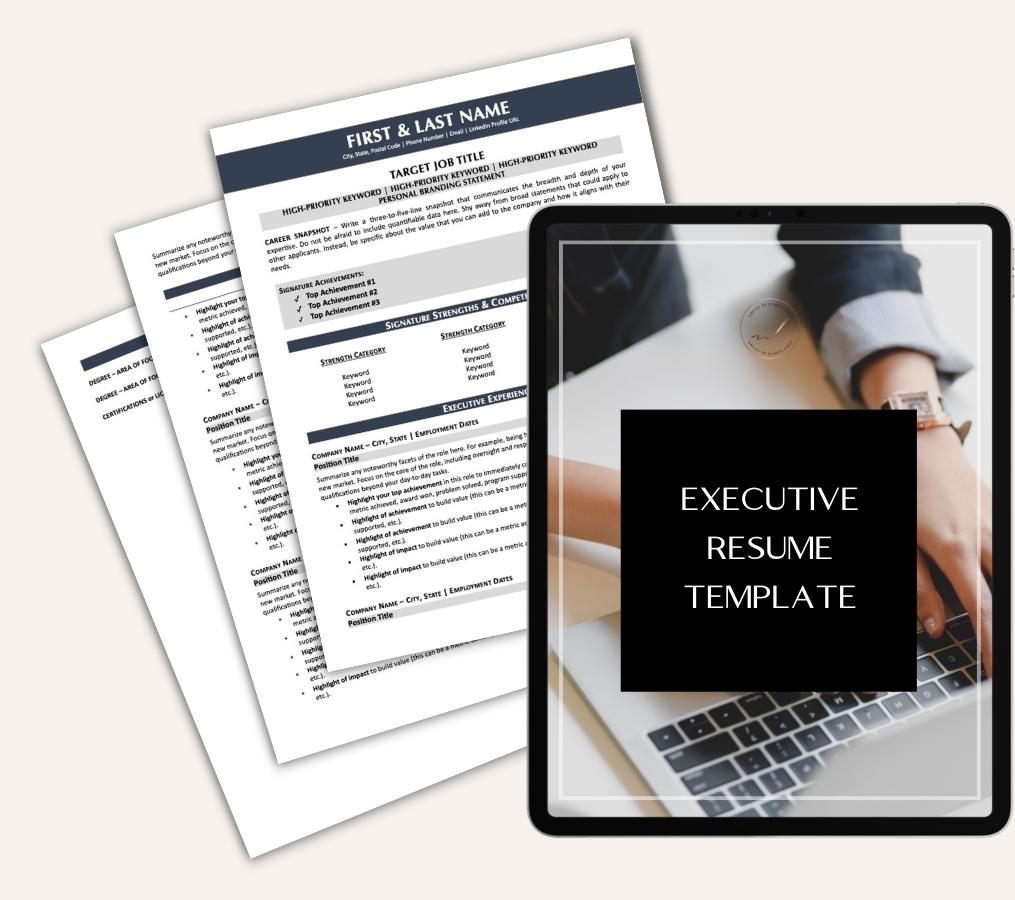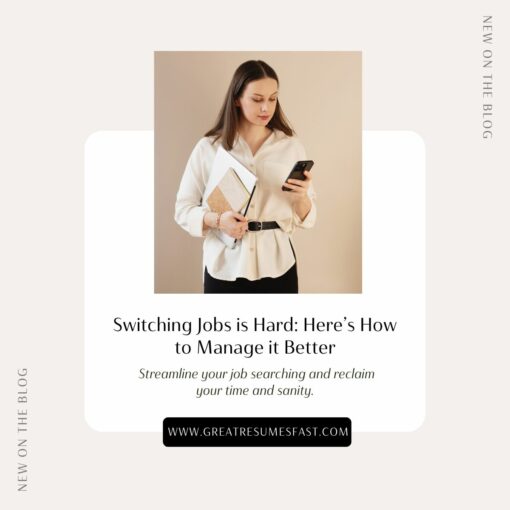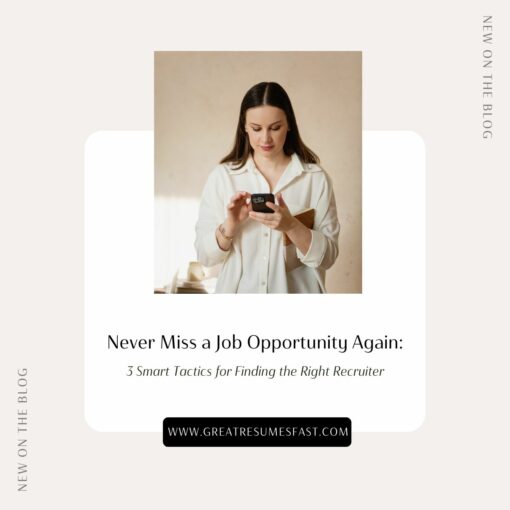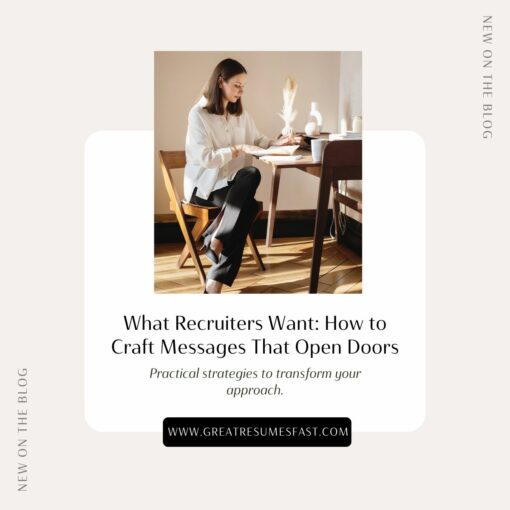How to Plan Your 2023 Job Search
Do you ever wonder if there’s a better way to job search than the apply + wait + get ghosted business that’s currently rampant in the job market? If one of your goals this year is to make a career move, then it’s time to be intentional and plan your 2023 job search.
After finishing this article, you’ll have an entire toolbox of ideas and strategies that you can start implementing in your job search right away.

On average, each corporate job posting attracts 250 resumes. Of those candidates, only four to six will get called for an interview, and only one will get the job.
Then, there are your career marketing materials. A resume isn’t enough anymore. More than half of employers surveyed by CareerBuilder stated a resume alone wasn’t enough information to decide if a candidate was a good fit. They turned to the candidate’s cover letter, portfolio, and social media sites to gather more information.
If you want to stand out to employers, get more responses from applications, and find your next position quicker, it’s time to implement a job search plan.
Plan Your 2023 Job Search: LinkedIn is Where to Start
So, where do you start your job search? In a LinkedIn survey, 82% of job seekers said networking was vitally important to finding a new job, but less than half of the respondents were actually networking.
To start immediately expanding your network, I’m a big fan of creating a target employer list, which is a detailed list of employers that you might be interested in working for. You can use a Google spreadsheet to make a list of your top 40 companies.
Years ago, when I decided to return to work after staying home with my daughter for a year, I searched every recruiting agency within a 30-mile radius of my house because that’s how far I was willing to commute. Back then, it was easy to use the phonebook or to Google everything within a certain distance.
Today, you can use LinkedIn for most of your research. To start your list, jot down the first 10 companies that come to mind. Most people usually start with household names. Then, move on to companies where your alma mater’s alumni work, which you can easily find by going to your school’s alumni page and checking out which organizations hire alumni from your school. Narrow it down to those with a similar degree as you.
That should give you at least 20 companies, and your target list will be half-finished. Next, head to LinkedIn or Indeed to search for your target job title and take a peek at who is hiring. Add another 10 companies to your list.
Lastly, look at the competitors for the companies that you’ve already included on your list. That should give you your final ten companies — for a total of 40. Having 40 companies is important because it gives you options!
Once you have your list, research each company — its culture, growth initiatives, greatest pain points, the common problems they face. The common problems and pain points need to be related to the role you would be targeting. That way, you can speak to how you can resolve these problems throughout your cover letter, resume, and networking efforts.
Find each company’s LinkedIn page, follow them, and like their posts. This will show the employer that you’re engaged with their talent brand, which will actually allow you to stand out when you apply for openings. LinkedIn will spotlight your application and alert the recruiter that you’re more likely to respond if they reach out to you about an opening.
Plan Your 2023 Job Search: Next Steps to Prepare for a Successful Job Search
Update your LinkedIn profile to ensure it reflects your personal brand, conveys your achievements, and is optimized for searches so that recruiters can find you. If you need help with this, check out the job search resources we offer on our website.
Start posting updates to LinkedIn a couple of times a week. I know it’s not easy when you’re first starting to share, but you’d be amazed at the difference it will make in your job search.
I share educational posts daily. I like to create graphics and share a tip that will help others who are job searching. What’s something you could share that would be educational? Think about people new to your industry and something they may not know that you could share. Or, you could share an industry-related article you read and add your thoughts.
Update your career marketing materials: resume, cover letter, value proposition letter, networking resume, and career bio. You want to have these ready well in advance. If you have a hard time telling your story in a way that employers understand, now is the time to work with a professional resume writer. You want your resume ready to share before someone in your network asks to see it or a recruiter reaches out.
Start practicing and preparing for interviews. One of the biggest areas where I see job seekers fail is the questions portion of the interview. Not asking questions can leave a negative impression with the employer. Asking great questions is not only a way to make a good impression, but it’s also a way to show the employer you’ve done research into the company. I interviewed a new team member, and when I asked if she had any questions, she frequently referred to what she had read on our website, in my blogs, and our core values. I loved how she asked questions about what she’d researched on our site. It let me know she was interested and committed to the job search process.
Increase conversations with your network, and let them know you’re exploring opportunities. Do you have an elevator pitch ready that you can share with anyone you meet?
An elevator pitch doesn’t have to be complicated. It can be as simple as, “I’m a (position title) with expertise in (keyword, keyword, and keyword). I’m exploring new opportunities in the (industry) industry as a (position title).”
Make it a goal to have three networking conversations three times a week. I like to schedule an hour every morning networking on LinkedIn. I post a status update, reply to comments on my posts, and comment on others’ posts. I also set aside time to email colleagues, just to ask how they’re doing and how things are going for them.
If you’re unsure who to contact, start with your Christmas card list, Facebook friends, LinkedIn connections, or past colleagues. You can also try alumni groups.
Plan Your 2023 Job Search: Get Active and Intentional in Your Search
If you’re actively or aggressively job searching, start scheduling informational interviews.
Take your target company list, and find three employees at each of your top five companies. Then, message them to ask for an informational interview.
Also, give people options when you request information. I’m not big on informational interviews over the phone but if you ask to email me 2 – 3 questions, I’m usually happy to oblige.
A couple of tips when contacting people about informational interviews:
- Be specific about what you’re requesting.
- Ask for information, advice, tips, strategies, or about their journey.
- Don’t ask for a job or a referral for a job if you do not know the person well. It takes time to build relationships—that’s why you must build your network before you need it.
Brush up on skills
Does the new position you’re targeting require any specific skills or certifications you don’t have? Ask about them in your informational interviews, and then start working on those.
Make sure to list any required skills for the job on your LinkedIn profile. This will help increase recruiter outreach. You want recruiters to be able to find you on LinkedIn, and for them to do that, you must have skills listed in your profile. Make sure you use all 50 spaces available to you, and add the top three skills for your target role to your LinkedIn headline. This increases your discoverability.
Finally, a big mistake I see too many job seekers make is that they spend 95% of their time applying online. Invest 20% of your time applying to positions you find on LinkedIn or job boards. Spend the other 80% of your time on activities that are more effective — conducting informational interviews, interacting with companies/connections, and posting to LinkedIn.
Would you like to make your next career move much faster?
If you’d like us to help you hit your ambitious job search goals (and you’re an executive-level job seeker in the U.S. or Canada), schedule a free resume strategy session.
On the call, our Client Services Manager, Kelly, will discuss the following:
- Your job search goals.
- How our methodology (the same process we use to land execs roles at Amazon, Apple, Google, Deloitte, and Pfizer) could best be applied to your job search.
- The questions and insights you need to double responses to your resume.
- The market, practical, and technical considerations that are most likely preventing you from getting offers quickly.
So, if you’d like to speak with us, book a call.
Share this post:

About the author
Jessica Hernandez, President, CEO & Founder of Great Resumes Fast
Hi, I’m Jessica. I started this company back in 2008 after more than a decade directing hiring practices at Fortune 500 companies.
What started as a side hustle (before that was even a word!) helping friends of friends with their resumes has now grown into a company that serves hundreds of happy clients a year. But the personal touch? I’ve kept that.
You might have seen me featured as a resume expert in publications like Forbes, Fast Company, and Fortune. And in 2020, I was honored to be named as a LinkedIn Top Voice of the year!
I’m so glad you’re here, and I can’t wait to help you find your next perfect-fit position!
1 Comments
Leave a Comment
Improve Your Resume: Download Your Free Executive Resume Template Today
Are you struggling to create an executive resume that will impress employers? Download this free executive resume template and receive a series of 10 emails with expert guidance on how to write resume content that resonates with employers so you get more interviews.
It's everything you need to stand out, make an impression, and accelerate your job search.









Thank you for this well-detailed content. I’m sure this will certainly be helpful in the near future.